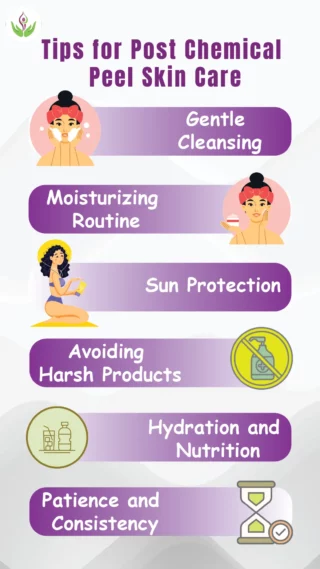Chemical peels are a popular cosmetic procedure that can rejuvenate the skin, addressing concerns such as acne, wrinkles, and uneven tone. Whether you have undergone a mild peel or a deeper treatment, proper aftercare is essential to ensure optimal results and minimize potential side effects. In this article, we’ll explore some valuable tips to help you take care of your skin after chemical peels.
Introduction to Chemical Peels
Chemical peels involve the application of a chemical solution to the skin, which exfoliates the top layers, revealing smoother, younger-looking skin underneath. They are effective for addressing various concerns such as acne, hyperpigmentation, fine lines, and uneven skin tone.
Understanding the Aftercare Process of Chemical Peels
Proper preparation sets the stage for successful post-peel recovery. Before undergoing a chemical peel, consult with a qualified dermatologist or skincare professional to assess your skin type, discuss treatment options, and address any concerns. Additionally, follow any pre-peel instructions provided by your skincare specialist, which may include avoiding certain skincare products or medications that could increase skin sensitivity.
Here is the aftercare process of chemical peels:
Immediate Post-Peel Care
Immediately after a chemical peel, your skin may feel tight, sensitive, and appear slightly red. It’s crucial to follow your dermatologist’s instructions carefully during this phase. Typically, a soothing moisturizer or hydrating serum may be recommended to alleviate discomfort and provide hydration.
Days 1-3: Recovery Phase
During the first few days following a chemical peel, your skin will undergo the initial stages of recovery. It’s essential to keep your skin clean and moisturized while avoiding harsh products or excessive sun exposure. Your dermatologist may prescribe specific creams or ointments to aid in the healing process.
Days 4-7: Healing Phase
As your skin continues to heal, you may experience some peeling or flaking, particularly in areas treated with a deeper peel. It’s crucial to resist the urge to pick or peel the skin, as this can lead to scarring or infection. Instead, focus on gentle exfoliation and moisturization to facilitate the natural shedding process.
Proper aftercare is crucial after a dermatologist supervised facial to avoid irritation and post-peel pigmentation.
Tips for Post-Chemical Peel Skin Care

Gentle Cleansing
Opt for a mild, non-abrasive cleanser to cleanse your skin gently. Avoid harsh scrubbing or exfoliation, as this can irritate the skin and disrupt the healing process.
Moisturizing Routine
Keep your skin well-hydrated with a nourishing moisturizer suited to your skin type. Look for products containing ingredients like hyaluronic acid, ceramides, and antioxidants to replenish moisture and support skin health.
Sun Protection
Protect your skin from harmful UV rays by wearing a broad-spectrum sunscreen with an SPF of 30+ or higher. UV exposure can increase the risk of pigmentation issues and compromise the results of your chemical peel.
Avoiding Harsh Products
Refrain from using harsh or abrasive skincare products, including scrubs, toners, and retinoids, until your skin has fully healed. These products can exacerbate irritation and prolong the recovery process.
Hydration and Nutrition
Stay hydrated by drinking plenty of water and consuming a balanced diet rich in vitamins, minerals, and antioxidants. Nutrient-rich foods can support skin health from within and promote faster healing after a chemical peel.
Patience and Consistency
Be patient and consistent with your skincare routine, allowing ample time for your skin to heal and regenerate. Results from chemical peels may take several weeks to fully manifest, so continue following your dermatologist’s recommendations for optimal outcomes.
Addressing Common Concerns
Managing Redness and Irritation
If you experience redness or irritation after a chemical peel, apply a soothing, anti-inflammatory product such as aloe vera gel or colloidal oatmeal. Avoid hot water, steam, or other irritants that can exacerbate sensitivity.
Dealing with Flaking and Peeling
To manage flaking or peeling, gently exfoliate your skin with a soft washcloth or gentle chemical exfoliant. Follow up with a rich moisturizer to lock in hydration and promote smoother, more radiant skin.
Handling Sensitivity
If your skin feels particularly sensitive after a chemical peel, opt for fragrance-free, hypoallergenic skincare products formulated for sensitive skin. Avoid excessive heat or cold, which can trigger further irritation.
Conclusion
Proper aftercare is essential for optimizing the results of a chemical peel and maintaining healthy, radiant skin. By following these tips and prioritizing gentle, nourishing skincare, you can enjoy the benefits of a chemical peel while minimizing potential side effects.
FAQs
It’s best to wait at least 24 to 48 hours before applying makeup to allow your skin to heal properly.
Avoid strenuous exercise or activities that cause excessive sweating for the first few days after a chemical peel to prevent irritation and infection.
Yes, your skin may be more sensitive to sunlight following a chemical peel. It’s crucial to wear sunscreen and protective clothing to minimize sun damage.
The frequency of chemical peels depends on various factors, including the type of peel and your skin’s response. Your dermatologist can recommend an appropriate treatment plan tailored to your needs.
While chemical peels are generally safe when performed by a qualified professional, there are potential risks such as scarring, infection, or changes in skin pigmentation. It’s essential to follow pre and post-treatment instructions carefully to minimize these risks.
It typically takes about one to two weeks for the skin to fully heal post-peel, depending on the depth of the peel and individual skin sensitivity.
While chemical peels can benefit many skin types, certain conditions, such as active acne, eczema, and dermatitis, may contraindicate treatment. Consultation with a dermatologist is crucial to determining suitability.














